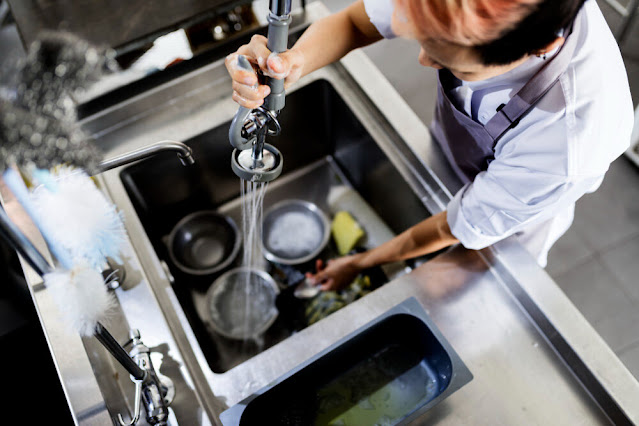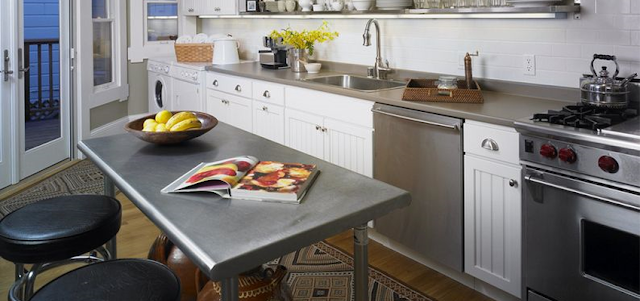Six methods to care for your exhaust hood canopy maintenance
The appliance installed over
industrial ranges, griddles, fryers and other food preparation equipment is
called an exhaust
hood canopy. It removes the unbearable heat, smoke and
debris in the air with the help of its efficient, high-quality fans and
specialises in removing all the contaminants out of the pantry.
Many researchers found that more
than 50% of fire incidents in catering and dining restaurants are due to
cooking products. These mishaps mainly constitute accidents involving
frequently used products, resulting in a considerable accumulation of debris
and dust in them. Such accidental mishaps are very difficult to contain if they
happen in a kitchen. Therefore, the national association to prevent
fire-related hazards stresses the requirement of operational and preventive
fire security to limit the prospective risk of fire in private and public
industrial food preparation operations. All of the above implies that frequent
maintenance of your product is needed. Failure in this department may result in
severe disasters like fire, leading to permanently discontinuing your business.
We will discuss the various steps of keeping a hood canopy maintained and
long-lasting in this content.
Commercial Gas Cooktops is one of the machines designed with stainless steel, easy to maintain, and makes the food preparation more effective. You can visit the home page of Simco to garner more knowledge on the topic.
Undergo Full Preparation Before Starting the
Maintenance Process
Turning off all the valves and ranges before
cleaning them is the primary step towards maintaining the product available on
Simco – one of the foremost exhaust hood canopy suppliers in Melbourne
& Sydney. It would be best to let the temperature go down by unplugging
the appliance. In addition, ensuring that every device nearby is not in use and
turned off is essential. You can cover all the instruments nearby once all the
above conditions are satisfied since there will be saturated contaminants and
debris all over. It is an intensely challenging task to clean such machines. In
addition, you must ensure the upkeep of your industrial kitchen by arranging
the following products:
·
Plastic sheets
·
Concerted degreaser
·
Mild-bristled brush or scouring pad
·
Rubber gloves
·
Cleaning container
Clean the Product Filters
Irrespective of the filters employed by a company - baffle, charcoal or mesh variant - you may find it going up and effortlessly sliding out. Once the filters are successfully removed, you must check on or near the grease vessels to uninstall any steel spacers nearby. Another method for maintaining an exhaust hood canopy filter is only to utilise a scrubbing pad and a mild brush. You can clean the device with the assistance of the dishwasher, provided they are not excessively dirty or extensive in size once the above process is done. However, you must wash the filter by filling a basin with water and a concerted degreaser if the device is large and inundated with dirt and debris. You must spare at least three hours to immerse your spacers and cleaners in the water. However, you should absorb and soak them in the water all night if you want better outcomes.
Clean the Oil Trap Expertly
Uninstall the grease vessels in this step if the procedure
mentioned above to clear the spacers and filters is done. You may find buckets
on each side of the exhaust hood canopy, which you should remove.
In addition, take care not to spill the grease by expertly handling the
appliance. Most kitchen personnel commit the error of depositing the soot
deposit into a drain. As such activity results in drain blocking, do not
perform this action. Instead, you can remove the grease by using a long-lasting
packed vessel. Once the process is completed, use soft brushes or scouring pads
to clean the traps. You may find the buckets too large to pass through the dish
pit. Please put them in the degreaser mixture with the purifiers for the same duration.
Many versions of Commercial Kitchen Equipment are
available on Simco, making the food preparation process effortless and
lightening the burden on your chef's shoulders. Visit our page for more
information.
Proficiently Clean the Hood Fan
You must remove the blades or blower fans once the
above procedures are done. Most lid hoods are available with a dual motor and
fan feature that draws air from both sides of the top and assists in equal
airflow allocation. Removing the fan's protective cover and pulling it down is
the first step. Once the process is completed, open the primary mechanism hub,
and use a brush or cleaning pad to scrub the fans gently. You can also immerse
the product in the wet mixture of filters and grease traps if you feel they are
excessively covered with soot and filth. After the initial wash, You can keep
them in a dishwasher if they're not that filthy.
Clean the Vent Properly
Ensuring the upkeep of the appliance vent is the
next step. Create a similar concerted degreaser mixture as your sink to launch
this process. However, please keep it in a small sanitiser vessel this time.
Employ the same soft scrubbing pad or brush to scrub the internal and external
parts of the exposed range awning. You can reset the other components after
adequately washing and cleaning the grease off the visible vent. You can get
the product by visiting Simco, one of the best exhaust hood canopy
suppliers in Brisbane & Perth.
https://simcocateringequipment.blogspot.com/2022/05/how-to-set-up-wall-mount-stainless.html
Restructure All the Machine Elements
Once you have cleaned and washed every component,
dry them properly. Once done, install the fans first. If your canopy employs a
dual-fan system, remember that they're directional and cannot be changed. This
fact means that you must put the left part on the left side and the right amount
on the corresponding side. Also, ensure not to leave your fan's protective
covers in the switched-off mode since these may seem underused with mounted
traps and are employed to hold hanging grease containers. However, they still protect
you from touching a fan blade when the motors work. Always switch the fans off
first in any condition before removing the exhaust hood canopy filters. Once
you reset the fans, put the grease baskets, spacers and filters back in place. After
removing the plastic sheeting surrounding you and cleaning the floors, your
work is completed.







Comments
Post a Comment